
In a typical student government election at Penn, candidates line Locust Walk and set up shop outside the Quad, collecting signatures from passersby to appear on the ballot. But this is far from a typical election — in the age of coronavirus, candidates are circulating Google forms on social media and campaigning completely online.
To alleviate the burden on candidates, the Nominations and Elections Committee reduced the number of signatures needed to appear on the ballot by 33% for each position. Many candidates praised the move, citing the difficulty of meeting the quota without the ability to interact with students on campus.
Elections for the Undergraduate Assembly and 2021, 2022, and 2023 Class Boards, which were originally scheduled to take place last spring when campus closed due to the coronavirus outbreak, will now be held on the Penn Student Government website from Sept. 12 to Sept. 14. Elections for the 2024 Class Board and UA New Student Representatives will be postponed until likely spring 2021.
As part of the campaign process, candidates had until Sept. 7 to collect enough signatures from their constituency to get on the ballot. Students running to be a 2023 College class chair, for example, were previously tasked with collecting 44 signatures from College sophomores and now only needed 29 signatures.
Some candidates said being able to interact with students in-person in previous years made the process of collecting signatures much easier.
College junior Tori Borlase, who is running for re-election as a College representative on the UA, said in a typical year, most of her signatures would have come from students she did not know on Locust Walk or in front of the Quad, which gave her a chance to explain her platform to them.
“Now it’s like I have to send [the Google form] to people I already know and to groups I’m already a part of,” Borlase said. “It can be kind of exclusionary for people that aren’t in Greek life or huge clubs.”
Borlase said she was pleased with the NEC’s decision to reduce the signature threshold to appear on the ballot this year, which helped remove a lot of pressure off the candidates.

College senior and candidate for UA President Mercedes Owens agreed that collecting signatures online has been more difficult than in person, as she had done previously when running for UA College representative in 2018. She said that both candidates and student voters are adjusting to a new school year under unusual circumstances.
“The student body is also trying to acclimate, so they're not as focused on signing petitions,” Owens said.
Owens said she has been able to gather enough signatures but with more effort than it would have taken in a normal year. UA President and Vice President are the two positions with the largest signature thresholds, requiring 242 signatures each from any full-time first year, sophomore, or junior after the reduction by the NEC.
Owens said she primarily collected signatures by sending her Google form in student organization group chats on GroupMe and posting the Google form link in her Instagram bio and Instagram story. Borlase added she also shared her Google form in Facebook groups.
College sophomore and candidate for 2023 Class Board President Michael Troka said that despite not being an incumbent, he has not found getting enough signatures to be too difficult. Troka said he has used similar strategies to Borlase and Owens, reaching out personally to friends and sharing the link to his Google form on social media.
In anticipation of the elections at the end of this week, candidates are ramping up their virtual campaigns on social media and looking forward to utilizing The Daily Pennsylvanian's NEC Candidate Center, which will feature one-minute videos during which candidates will introduce themselves and promote their platforms.
Borlase said she does not anticipate that her campaign will differ greatly from her one last year, in which she campaigned primarily on social media. She said that she has created a Facebook page for her campaign, which she will share with friends and in group chats on GroupMe.
Troka said he plans to use a campaign Instagram page to promote his candidacy to the sophomore class and hopes his video to be posted on the DP's NEC Candidate Center will garner attention as well.
Despite the absence of in-person campaigning, Owens said she hopes students will still want to engage with their student government and vote this coming election.
“Hopefully seeing everybody's motivation and their excitement to still be a part of student government will be motivating for the student body to vote and to engage with our campaigns,” Owens said.
The Daily Pennsylvanian is an independent, student-run newspaper. Please consider making a donation to support the coverage that shapes the University. Your generosity ensures a future of strong journalism at Penn.
Donate







